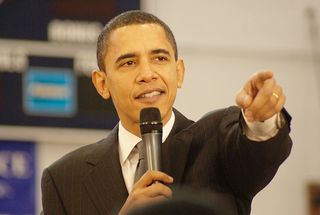Religion
Some Facts about Facts
Do we have any common bases for ascertaining what's true and what's not?
Posted May 14, 2016

Facts Up for Grabs?
On the ninth anniversary of announcing his candidacy for the nation's highest office, President Obama returned to Springfield, Illinois in February where he spoke to the Illinois General Assembly. In that speech President Obama proposed that, although polarization is nothing new in American politics, the origins and degree of polarization currently are different from those in the past. He offered some hypotheses about contributing factors to the contemporary political climate. He pointed to a variety of considerations including the development of sophisticated, computerized analyses of voting patterns by well-funded, targeted interest groups, on the one hand, and gerrymandering state legislators, on the other, rendering, in the latter case, roughly 90% of congressional districts comparatively safe for candidates from one or the other of the two major American political parties. That, in turn, is but one of many historical factors the President noted that have led to the increasing homogeneity of both political parties.
Mr. Obama also cited the media, describing them as "fractured." Between cable television and websites, people can and largely do confine themselves to outlets that both echo and encourage their existing political convictions. They rarely confront views opposed to their own. The President then offered a pair of fascinating observations about the impact of such arrangements on the citizenry: "we can choose our own facts. We don't have a common basis for what's true and what's not." Let me address the two observations in reverse order.
Science: A "Common Basis" for Ascertaining the Facts
For anyone impressed by the accomplishments of science over the last four hundred years, any widespread presumption that we have no common basis for getting clear about the truth in many domains is a remarkable state of affairs. Science is a cultural invention, collectively designed with ever increasing care and scrutiny, to serve precisely as a common basis for improving our accounts of what's true about the empirical world and what's not. Of course, science is, by no means, infallible -- it is, after all, a human undertaking -- but humans have devised no better general approaches for adjudicating disputes about empirical facts.
Still, science frequently does not directly address the issues at the core of many political debates, such as the proper balance between social order and personal liberty or between the sometimes conflicting interests of the public and the interests of property owners. Some politically contentious issues, though, do seem to turn on empirical facts. Whether climate change is occurring and whether human conduct over the past two centuries has been a significant factor influencing that process are examples that leap to mind. As a "common basis" on which such matters get sorted out, science is second to none. To pretend otherwise is to traffic in obfuscation, if not outright deception.
Facts for the Choosing?
In an episode of "Last Week Tonight," John Oliver hilariously lampoons the notion that people and scientists, in particular, can simply choose which facts to accept and, perhaps more importantly, which facts to ignore. Following a brief excerpt from the "Today" show in which Al Roker proposes just such an approach, Oliver claims that Roker is confusing science with religion, which Oliver holds is where you get to "cherry pick the parts that justify what you were going to do anyway."
Setting aside the question of whether Oliver has characterized religion correctly or not, research in cognitive science on scientific reasoning, that is, scientific studies of scientists' reasoning, offers evidence that even professional scientists are capable of giving in to such cherry picking some of the time. In the cognitive science of science that is known as exhibiting confirmation bias.
This is where the cultural foundations of science are crucial. Individual scientists may be susceptible to all of the cognitive and character weaknesses that other human beings are. What protects science from widespread fraud and abuse is that it is a collective endeavor, in which the community of scientists jointly articulate, support, and enforce standards of method, reasoning, and evidence within the confines of an institution in which, at least ideally, anyone is capable of checking on anyone else. Invariably, it is scientists themselves who ferret out the cheaters in their midst.


